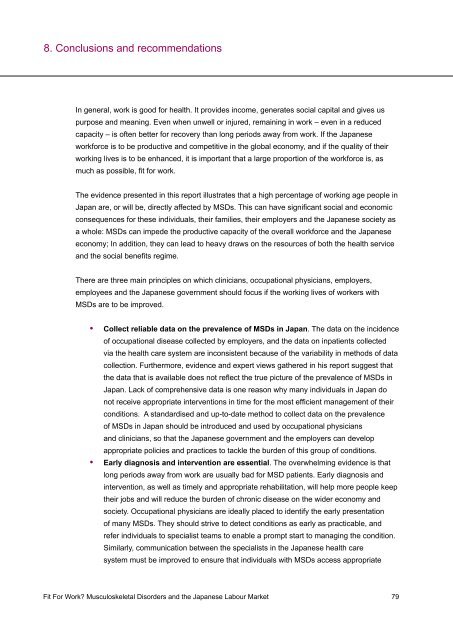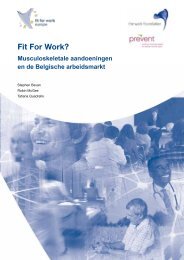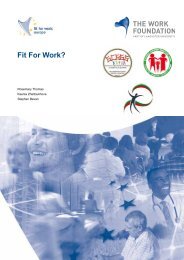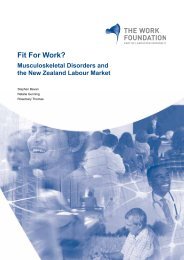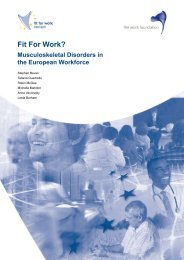English version - Fit for Work Europe
English version - Fit for Work Europe
English version - Fit for Work Europe
Create successful ePaper yourself
Turn your PDF publications into a flip-book with our unique Google optimized e-Paper software.
8. Conclusions and recommendations<br />
In general, work is good <strong>for</strong> health. It provides income, generates social capital and gives us<br />
purpose and meaning. Even when unwell or injured, remaining in work – even in a reduced<br />
capacity – is often better <strong>for</strong> recovery than long periods away from work. If the Japanese<br />
work<strong>for</strong>ce is to be productive and competitive in the global economy, and if the quality of their<br />
working lives is to be enhanced, it is important that a large proportion of the work<strong>for</strong>ce is, as<br />
much as possible, fit <strong>for</strong> work.<br />
The evidence presented in this report illustrates that a high percentage of working age people in<br />
Japan are, or will be, directly affected by MSDs. This can have significant social and economic<br />
consequences <strong>for</strong> these individuals, their families, their employers and the Japanese society as<br />
a whole: MSDs can impede the productive capacity of the overall work<strong>for</strong>ce and the Japanese<br />
economy; In addition, they can lead to heavy draws on the resources of both the health service<br />
and the social benefits regime.<br />
There are three main principles on which clinicians, occupational physicians, employers,<br />
employees and the Japanese government should focus if the working lives of workers with<br />
MSDs are to be improved.<br />
• Collect reliable data on the prevalence of MSDs in Japan. The data on the incidence<br />
of occupational disease collected by employers, and the data on inpatients collected<br />
via the health care system are inconsistent because of the variability in methods of data<br />
collection. Furthermore, evidence and expert views gathered in his report suggest that<br />
the data that is available does not reflect the true picture of the prevalence of MSDs in<br />
Japan. Lack of comprehensive data is one reason why many individuals in Japan do<br />
not receive appropriate interventions in time <strong>for</strong> the most efficient management of their<br />
conditions. A standardised and up-to-date method to collect data on the prevalence<br />
of MSDs in Japan should be introduced and used by occupational physicians<br />
and clinicians, so that the Japanese government and the employers can develop<br />
appropriate policies and practices to tackle the burden of this group of conditions.<br />
• Early diagnosis and intervention are essential. The overwhelming evidence is that<br />
long periods away from work are usually bad <strong>for</strong> MSD patients. Early diagnosis and<br />
intervention, as well as timely and appropriate rehabilitation, will help more people keep<br />
their jobs and will reduce the burden of chronic disease on the wider economy and<br />
society. Occupational physicians are ideally placed to identify the early presentation<br />
of many MSDs. They should strive to detect conditions as early as practicable, and<br />
refer individuals to specialist teams to enable a prompt start to managing the condition.<br />
Similarly, communication between the specialists in the Japanese health care<br />
system must be improved to ensure that individuals with MSDs access appropriate<br />
<strong>Fit</strong> For <strong>Work</strong>? Musculoskeletal Disorders and the Japanese Labour Market 79


